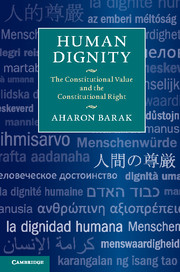Preface
Published online by Cambridge University Press: 05 February 2015
Summary
The concept of human dignity has a 2,500 year history. As it has moved through history, the concept has been influenced by different religions which held it as an important component of their theological approach. It was also influenced by the views of philosophers who developed human dignity in their contemplations. In the twentieth century, the concept encountered a new phenomenon. The atrocities of the Second World War, and particularly the Holocaust of the Jewish people, brought human dignity into the forefront of legal discourse. As a result, constitutional and international legal texts began to adopt the concept, and jurists appeared alongside the theologians and the philosophers. Legal scholars were called upon to determine the theoretical basis of human dignity as a constitutional value and as a constitutional right. Judges were required to solve practical problems created by the constitutionalization of human dignity, as a value or as a right.
This book discusses the legal-constitutional aspect of human dignity. It makes no theological or philosophical contribution. I do not argue with Jewish or Christian religious sages; I have no dispute with Kant. I attempt, through legal analysis, to explain human dignity as a constitutional value and as a constitutional right. Of course, law is not detached from life. Legal understanding is influenced by theological and philosophical views. It is not, however, identical to them. Aquinas and Kant were not dealing with the interpretation of a constitutional bill of rights in which the value of human dignity, or the right to human dignity, is entrenched. Of course, the legal solutions for practical problems at times overlap the solutions that theologians or philosophers promote. This is the Rawlsian phenomenon of “overlapping consensus.” However, the theoretical points of departure are different: the point of departure for understanding human dignity in a constitutional bill of rights is the constitution, not theological or philosophical considerations.
- Type
- Chapter
- Information
- Human DignityThe Constitutional Value and the Constitutional Right, pp. xvii - xxvPublisher: Cambridge University PressPrint publication year: 2015



